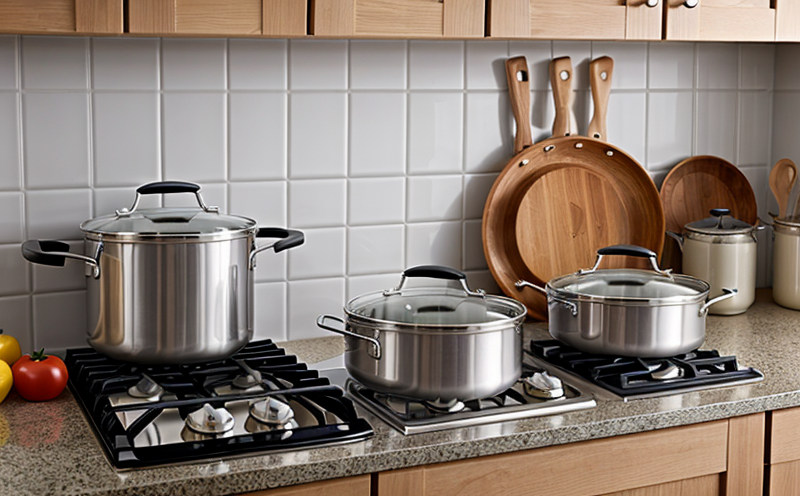Recyclability Testing of Kitchenware Products
The demand for sustainable products has grown significantly in recent years, leading to an increased focus on the recyclability of consumer goods. In particular, kitchenware and cookware products are subject to rigorous testing to ensure they meet environmental standards while maintaining functional integrity. Recyclability testing is a critical step in the product development process that ensures materials can be efficiently recycled, thereby reducing waste and conserving natural resources.
Recyclability testing encompasses several key parameters including material composition analysis, degradation under recycling conditions, and the ability to produce high-quality secondary products without contamination. The primary objective of this service is to provide manufacturers with reliable data on how their kitchenware can be effectively recycled, thereby promoting a circular economy within the industry.
Our team utilizes advanced analytical techniques such as near-infrared spectroscopy (NIRS), Fourier-transform infrared spectroscopy (FTIR), and gas chromatography-mass spectrometry (GC-MS) to determine the exact composition of materials used in kitchenware products. This information is crucial for assessing the compatibility of different components during the recycling process.
Additionally, our laboratory simulates real-world recycling conditions using standardized protocols based on international standards such as ISO 14046 and ASTM D7835-20. These tests evaluate how well the material degrades into reusable compounds without compromising its original properties. The results of these assessments are reported comprehensively to help guide further design iterations towards more sustainable solutions.
For quality managers, recyclability testing offers valuable insights into potential improvements in production processes and raw materials sourcing. Compliance officers can leverage this data to ensure their products comply with relevant regulations regarding end-of-life disposal practices. R&D engineers benefit from understanding which modifications would enhance both the functionality of new designs and their sustainability credentials.
Procurement teams also stand to gain by knowing what types of suppliers offer materials that align best with recycling goals. By working closely with these stakeholders throughout the project lifecycle, we aim not only to deliver accurate test results but also foster collaboration towards creating greener alternatives for everyday household items such as pots and pans.
By implementing recyclability testing early in the design phase, manufacturers can significantly reduce their environmental footprint while still delivering innovative products that meet consumer expectations. This approach aligns perfectly with broader sustainability initiatives aimed at promoting responsible consumption patterns across industries globally.
- Material Identification: Using advanced spectroscopic methods to identify all constituent parts of a product.
- Recycling Simulation: Replicating actual recycling processes to assess material stability and degradability.
- Contamination Assessment: Evaluating the risk of introducing contaminants into recycled streams through improper design choices.
Through meticulous attention to detail, our experts ensure that every aspect contributing to recyclability is thoroughly examined. This comprehensive approach guarantees that clients receive actionable recommendations tailored specifically for their unique needs and goals within the kitchenware sector.
Benefits
Implementing recyclability testing early in the product development process offers numerous advantages, particularly when it comes to enhancing brand reputation and regulatory compliance. Here are some key benefits:
- Enhanced Brand Reputation: Demonstrating commitment to sustainability can significantly boost customer loyalty and attract environmentally conscious consumers.
- Regulatory Compliance: Ensuring adherence to local and international environmental regulations helps avoid costly fines and legal disputes.
- Innovation Opportunities: The insights gained from recyclability testing can drive innovation in material selection and design improvements, leading to more durable products with reduced waste generation.
- Cost Savings: Identifying ways to minimize raw material costs while maintaining product quality through optimized recycling methods.
Moreover, incorporating recyclable features into your kitchenware line not only strengthens brand values but also contributes positively to society by reducing landfill usage and conserving natural resources. It underscores a company’s responsibility towards future generations, fostering trust among stakeholders who value corporate social responsibility (CSR).
Customer Impact and Satisfaction
The implementation of recyclability testing directly impacts customer satisfaction by addressing two critical aspects: environmental awareness and product longevity. When customers know that the products they purchase are designed with recycling in mind, it enhances their perception of the brand’s commitment to sustainability.
- Environmental Awareness: Educated consumers appreciate companies taking proactive steps towards minimizing waste and protecting natural resources. This knowledge fosters loyalty and encourages repeat purchases.
- Product Longevity: By ensuring that materials used in kitchenware are durable yet recyclable, customers enjoy products that not only meet current standards but also hold up well over time without needing frequent replacements.
Furthermore, providing transparent communication about the recycling capabilities of a product increases transparency and builds trust between manufacturers and end-users. Such openness allows customers to make informed decisions based on accurate information regarding their purchase’s environmental impact.
In summary, recyclability testing plays a vital role in enhancing customer satisfaction by aligning with growing consumer demand for eco-friendly products while simultaneously improving overall brand reputation.
Environmental and Sustainability Contributions
Recyclability testing contributes significantly to environmental sustainability efforts by promoting the principles of a circular economy. By ensuring that kitchenware products can be effectively recycled, manufacturers play an essential role in closing material loops within supply chains. This practice helps reduce waste sent directly to landfills, which often results from single-use or non-recyclable items.
Implementing sustainable practices early in the design cycle allows for better integration of recyclable materials into final products. Through this process, manufacturers can minimize energy consumption associated with production processes and contribute positively to reducing carbon footprints across supply chains.
The benefits extend beyond immediate impacts; they include long-term reductions in resource depletion rates, enhanced biodiversity protection, and improved air quality due to decreased reliance on fossil fuels during manufacturing stages. Such actions align closely with global commitments towards achieving net-zero emissions targets by 2050 as outlined within frameworks like the Paris Agreement.
By embracing recyclability testing for kitchenware products, businesses demonstrate their proactive stance in addressing pressing environmental challenges faced worldwide today. This commitment reinforces corporate social responsibility (CSR) initiatives aimed at fostering healthier ecosystems globally.





